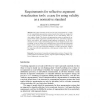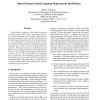1229 search results - page 8 / 246 » Reflections on the Design of a Specification language |
LOBJET
2006
13 years 7 months ago
2006
ABSTRACT. Aspect-orientation promises better modularity than pure object-oriented decomposition. A typical benefit of increased modularity is ease of maintenance, evolution and reu...
COMMA
2008
13 years 9 months ago
2008
This paper formulates in the first part some requirements for a certain sort of computational argumentation systems, namely those which are designed for a very specific purpose: to...
CORR
2010
Springer
13 years 7 months ago
2010
Springer
Current middleware systems suffer from drawbacks. Often one is forced to make decisions early in the design process about which classes may participate in inter-machine communicat...
ACSC
2000
IEEE
13 years 11 months ago
2000
IEEE
A methodology is proposed for the formal development of software systems from a user's requirements specification in natural language into a complete implementation, proceedi...
DAC
1998
ACM
14 years 8 months ago
1998
ACM
Successive, formal refinement is a new approach for specification of embedded systems using a general-purpose programming language. Systems are formally modeled as Abstractable Sy...


